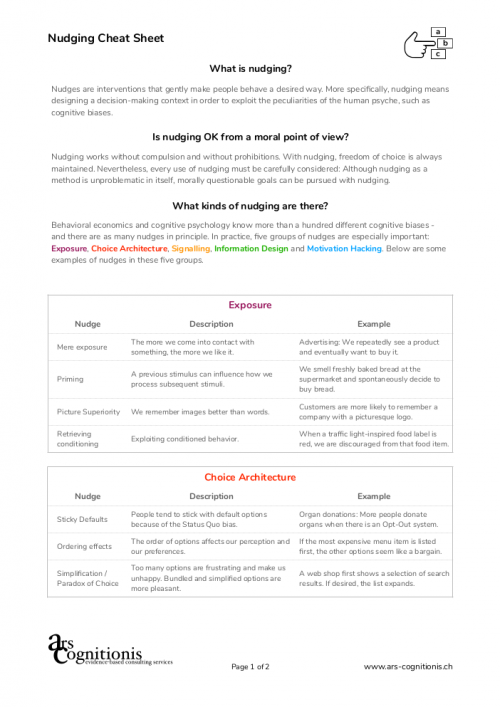Nudging Cheat Sheet
Changing behavior through gentle nudges.
What is the Nudging Cheat Sheet?

Nudging means exploiting irrationality in a targeted way in order to gently move people to a certain behavior – without coercion and without prohibitions. Nudging is the practical application of Behavioral Economics.
The Nudging Cheat Sheet is a source of inspiration for nudging in practice. In the Cheat Sheet you will find examples of five types of nudges and nudging mechanisms; these serve as inspiration for the design of your own nudging measures.
Download the Nudging Cheat Sheet
You can download the Nudging Cheat Sheet for free as a PDF:
Instructions
- Nudging does not increase the rationality of people influenced by nudging. Nudging changes human behavior, but does not make it more rational.
- Nudging as a method works particularly well when the decision context that is adapted affects as many people as possible. The more people, the greater the overall impact.
- The nudging examples in the Cheat Sheet are not exhaustive. They show how nudging can work in the sense of food for thought.
- Problem definition: What is the specific problem to be addressed by nudging measures? (Ist-Zustand)
- Goal definition: What is the specific goal or goals with regard to the problem?
- Behavioral analysis: What is the concrete decision-making context in which measures to increase happiness are to be introduced?
- Target behavior: What is the desired behavior in the relevant decision-making context to achieve the goals?
- Measures: Which nudging measures can used to achieve the desired goal behavior?
- Well-designed nudging interventions can typically result in behavioral changes in the range of about 10% to 20%.
- Whenever possible, the implementation of nudging measures should be empirical, i.e. evidence-based. If the real-world impact is measured, the measures can also be iteratively improved.
- Depending on the problem, nudging measures are well suited for experimental arrangements. The impact of nudging measures can be tested experimentally on a smaller scale in order to then introduce the most effective variants of measures across the board. The experimental approach can be very cost-effective.
Contact
Do you have questions about the Nudging Cheat Sheet or about nudging in general? We’re happy to help!
